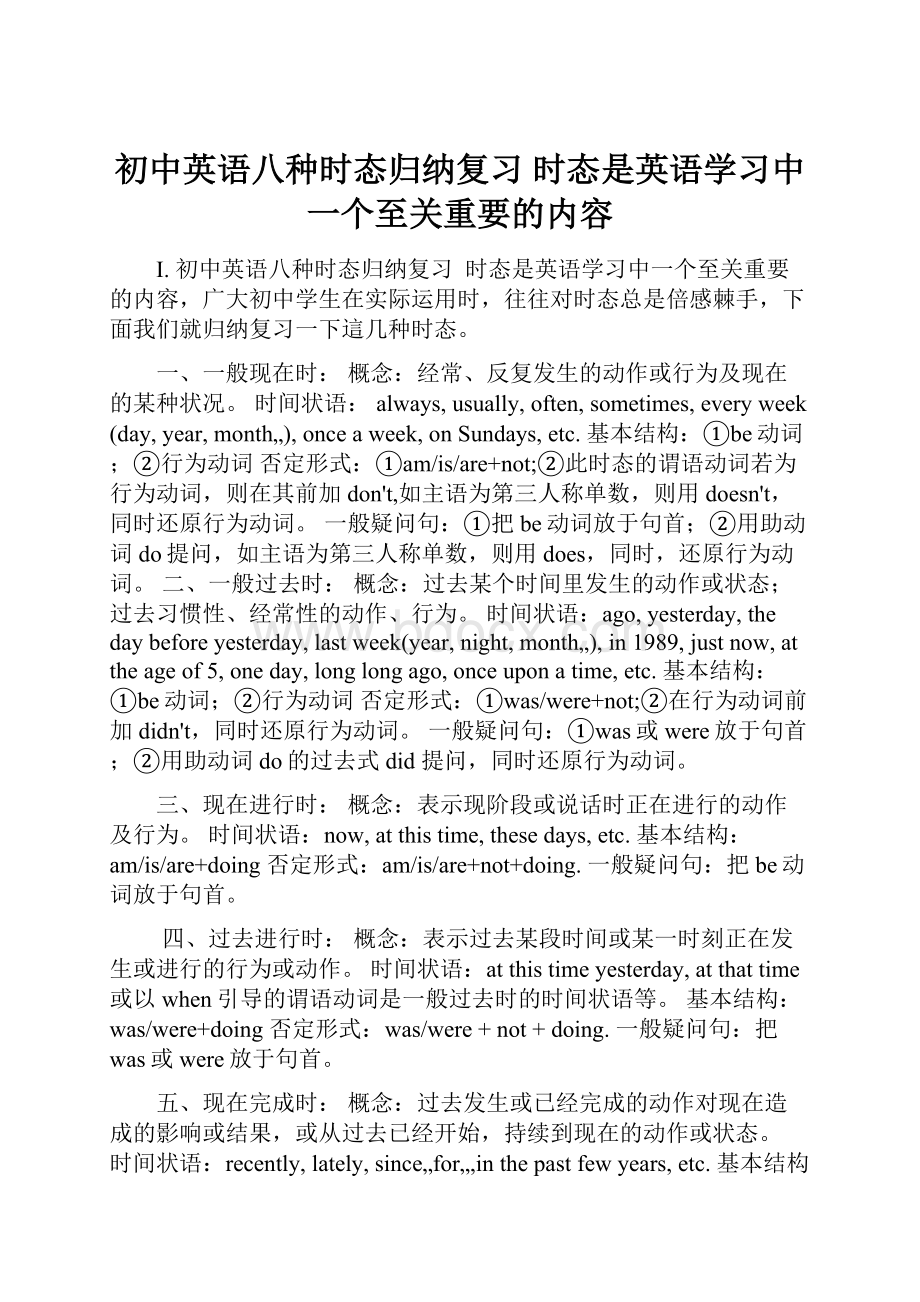初中英语八种时态归纳复习时态是英语学习中一个至关重要的内容.docx
《初中英语八种时态归纳复习时态是英语学习中一个至关重要的内容.docx》由会员分享,可在线阅读,更多相关《初中英语八种时态归纳复习时态是英语学习中一个至关重要的内容.docx(11页珍藏版)》请在冰豆网上搜索。

初中英语八种时态归纳复习时态是英语学习中一个至关重要的内容
Ⅰ.初中英语八种时态归纳复习时态是英语学习中一个至关重要的内容,广大初中学生在实际运用时,往往对时态总是倍感棘手,下面我们就归纳复习一下這几种时态。
一、一般现在时:
概念:
经常、反复发生的动作或行为及现在的某种状况。
时间状语:
always,usually,often,sometimes,everyweek(day,year,month„),onceaweek,onSundays,etc.基本结构:
①be动词;②行为动词否定形式:
①am/is/are+not;②此时态的谓语动词若为行为动词,则在其前加don't,如主语为第三人称单数,则用doesn't,同时还原行为动词。
一般疑问句:
①把be动词放于句首;②用助动词do提问,如主语为第三人称单数,则用does,同时,还原行为动词。
二、一般过去时:
概念:
过去某个时间里发生的动作或状态;过去习惯性、经常性的动作、行为。
时间状语:
ago,yesterday,thedaybeforeyesterday,lastweek(year,night,month„),in1989,justnow,attheageof5,oneday,longlongago,onceuponatime,etc.基本结构:
①be动词;②行为动词否定形式:
①was/were+not;②在行为动词前加didn't,同时还原行为动词。
一般疑问句:
①was或were放于句首;②用助动词do的过去式did提问,同时还原行为动词。
三、现在进行时:
概念:
表示现阶段或说话时正在进行的动作及行为。
时间状语:
now,atthistime,thesedays,etc.基本结构:
am/is/are+doing否定形式:
am/is/are+not+doing.一般疑问句:
把be动词放于句首。
四、过去进行时:
概念:
表示过去某段时间或某一时刻正在发生或进行的行为或动作。
时间状语:
atthistimeyesterday,atthattime或以when引导的谓语动词是一般过去时的时间状语等。
基本结构:
was/were+doing否定形式:
was/were+not+doing.一般疑问句:
把was或were放于句首。
五、现在完成时:
概念:
过去发生或已经完成的动作对现在造成的影响或结果,或从过去已经开始,持续到现在的动作或状态。
时间状语:
recently,lately,since„for„,inthepastfewyears,etc.基本结构:
have/has+done否定形式:
have/has+not+done.一般疑问句:
have或has。
六、过去完成时:
概念:
以过去某个时间为标准,在此以前发生的动作或行为,或在过去某动作之前完成的行为,即“过去的过去”。
时间状语:
before,bytheendoflastyear(term,month„),etc.基本结构:
had+done.否定形式:
had+not+done.一般疑问句:
had放于句首。
七、一般将来时:
概念:
表示将要发生的动作或存在的状态及打算、计划或准备做某事。
时间状语:
tomorrow,nextday(week,month,year„),soon,inafewminutes,by„,thedayaftertomorrow,etc.基本结构:
①am/is/are/goingto+do;②will/shall+do.否定形式:
①was/were+not;②在行为动词前加didn't,同时还原行为动词。
一般疑问句:
①be放于句首;②will/shall提到句首。
八、过去将来时:
概念:
立足于过去某一时刻,从过去看将来,常用于宾语从句中。
时间状语:
thenextday(morning,year„),thefollowingmonth(week„),etc.基本结构:
①was/were/goingto+do;②would/should+do.否定形式:
①was/were/not+goingto+do;②would/should+not+do.一般疑问句:
①was或were放于句首;②would/should提到句首。
Ⅱ.几种常見时态的相互轉换英语中的几种时态在一定情况下可以互相轉换,以下是几种常見的轉换形式:
一、一般过去时与现在完成时的轉换在现在完成时中,延续性动词能与表示一段时间的状语連用,瞬间动词却不能。
但是,可用別的表达方式:
①瞬间动词用于“一段时间+ago”的一般过去时的句型中;②瞬间动词可改成与之相对應的延续性动词及短语,与一段时间連用;③瞬间动词用于“Itis+一段时间+since+一般过去时”的句型中,表示“自从„„以来有„„时间”的意思,主句一般用itis来代替Ithasbeen;④瞬间动词用于“Sometimehaspassedsince+一般过去时”的句型中。
请看:
A.HejoinedtheLeaguetwoyearsago.B.HehasbeenintheLeaguefortwoyears.C.ItistwoyearssincehejoinedtheLeague.D.TwoyearshaspassedsincehejoinedtheLeague.二、一般现在时与现在进行时的轉换在一般现在时中,at加上名词表示“处于某种状态”,如atwork(在工作),atschool(上学、上课)等。
此短语可与进行时态轉换。
请看:
Peterisatwork,butMikeisatplay.Peterisworking,butMikeisplaying.三、现在进行时与一般将来时的轉换在现在进行时态中go,come,leave,start,arrive等动词常与表示将来的时间状语連用表示将要发生的动作。
如:
Iamcoming,Mum!
意为“我就来,妈妈!
”请看:
Thetrainisleavingsoon.Thetrainwillleavesoon.四、“begoingto+动词原形”与“will(shall)+动词原形”结构的轉换“begoingto+动词原形”、表示打算、计划要做的事;将来时“will(shall)+动词原形”结构在书面语中,当主语为第一人称时,常用助动词shall。
在口语中,所有人称都可以用will。
请看:
WearegoingtovisittheGreatWallnextSunday.WeshallvisittheGreatWallnextSunday
1.We_____heretoday.A.areallB.allarec.isalld.allis
2.Themap_____Chinais______thewall________ourclassroom.A.in,of,onB.of,on,inC.of,on,ofD.of,of,on
3.What'selevenandtwenty?
Itis_______.A.thirty-oneB.thirtyoneB.thirty-twod.thirtytwo4.Whatcolourisanorange?
Itis______.
A.redB.orangeC.whiteD.black
5.______doyoulikeChina?
Ithinkitisverybeautiful.A.HowB.WhatC.WhereD.Which
6.Isthereanychickenontheplate?
Yes,thereis______A.manyB.anyC.oneD.some
7.Pleasebuysomefoodfromtheshop_________.A.onyourwaytohomeB.toyourwayhomeC.onyourwayhomeD.atyourwaytohome
8.There______milkintheglass.A.aren'tmanyB.aren'tmuchC.isn'tmanyD.isn'tmuch
9.Why_______playwiththoseboys?
A.notB.noC.don'tD./
10.Doyouusuallygotoschool_____foot?
A.onB.inC.atD.by
11.MrGreen______suppernow.Heoften_______supperathalfpastsix.A.ishaving,haveB.ishaving,hasC.has,hasD.have,have
12.ZhangMingisgood______Chinese.Heoftenhelps______it.A.is,mewithB.at,IwithC.at,mewithD.on,Iin
13.Mayshe_______withyou?
A.comeB.comesC.comingD.comes
14.Myfatherhadabusyday_______.A.thedaybeforeyesterdayB.tomorrowC.nextSaturdayD.everyday15.Pleaseshow______newpicturebook.A.heyourB.hisyouC.himyourD.himyou
16.______willyoustaythere?
A.HowlongB.WhattimeC.HowoftenD.When
17.TheGreens________workinginthegardennow.A.amB.isC.areD.were
18.Doesheoften_______hismother______theroom?
A.help,cleansB.help,cleanC.helps,cleaningD.helps,clean
19.Mustwefinishourhomeworknow?
No,you______.You_______finishitafterschool.A.needn't,mayB.mustn't,mayC.can'tcanD.needn't,must
20.Wouldyoulike_______toeat?
A.anythingdifferentB.differentanythingC.somethingdifferentD.differentsomething
21.Hecanswim._______.A.SoIcanB.SocanIC.IsocanD.CanIso
22.Willtherebeastrongwind____thenorth______theHuangheRiver?
A.to...ofB.to...offC.at...ofD.on,off
23.Diditsnow_______lastnight?
A.heavyB.heavilyCQuickD.fast
24._______colditistoday!
A.HowB.HowaC.WhatD.Whata
25.Isthisbookdifferent______thatone?
A.aboutB.atC.toD.from
26.It'stimeforourlesson.Stop_______.A.playingB.toplayC.playsD.played
27.Helpyourself_______somefish.A.atB.tooC.toD.on
28.Herearesomepictures________.A.ofhimB.ofheC.abouthimD.abouthis
29.Thebook_______onthedesk.A.noislongerB.nolongerisC.isnolongerD.nolonger
30.Thenwe_______aroundbut_______nothing.A.looked,lookedB.saw,lookedC.saw,sawD.looked,saw31.ZhangLanisill.Letmegotothemeetinginstead_______.A.ofsheB.ofherC.offsheD.offhe
32.Whichistheway_________thenearesthospital?
A.inB.tooC.toD.at
33.Nice______toyou?
A.talkB.talkingC.totalkD.talks
34.Myparents______wanttogototheMonkeyIsland.A.allB.bothC.everyD.other
35.–Doyoulikefootball?
--No,Ihave_______interestinit.A.alittleB.afewC.littleD.few
36.Lucyrunsmuchfasterthan______inherclass.A.anyothergirlB.anygirlC.allgirlsD.everygirl
37.Whathashe______themeat?
Hehasjustcookedit.A.takecareofB.catchupwithC.donewithD.paidfor38.Lilythinksforeignlanguagesareas______assciencesubjects.A.importantB.mostimportantC.moreimportantD.importantest
39.Wouldyouplease______itagainlikethat?
A.notreadB.nottoreadD.readsD.reading
40.I'llphoneyouassoonasI_______.A.gettohomeB.gottohomeC.gethomeD.gothome
41.Youmustkeepyoureyes________.A.closedB.closeC.beclosedD.toclosed
42.Afarmerarrived_______awomen'shouse.A.inB.atC.toD.for
43.Katesaysthatshe_______amessageonthedesk.A.willleaveB.leaveC.willgiveD.give
44.Hehastwokites,oneisbig,______issmall.A.theotherB.anotherC.otherD.others
45.Computersarethesecondmostuseful____oftheworld.A.inventionsB.inventorsC.inventionD.inventor
46.OnmywayhomeIsawadog_______ontheground.A.lyingB.liesC.liedD.tolie
47.Thereislittlewaterintheglass,_______?
A.isn'tthereB.isitC.isthereD.wasn'tthere.
48.Twomonths_____quitelongforme.Ican'twait.A.isB.areC.wereD.isgoingtobe
49.Idon'tknow______.A.wheredoesJimliveB.wheredidJimliveC.whereJimlivesD.whereisJimlive50.Theboywasveryinterested_______English.A.atB.inC.toD.on
51.--Excuseme,where'sthepostoffice?
--Sorry,Idon'tknow.--______A.Itdoesn’tmatterB.AllrightC.ThankyouallthesameD.Don'tworry
52.Pleasegivemeacupofcoffee.A.ThankyouB.GiveyouC.HereareyouD.Hereyouare
53.Marydoesn'tlikeporkfordinner.Idon'tlikeit,______.A.neitherB.tooC.alsoD.either
54.LucyandLilyaretwins.Buttheyhave______differences.A.afewsmallB.smallfewC.alittlesmallD.smallafew
55.Thoughhelivesinthecountryside,heneverfeels_______.A.afraidofB.lonelyC.sadD.sadly
56.JapanandGermanyare________countries.A.developedB.developingC.developD.todevelop
57.I______myclassmateswhiletheyoftenfight.A.gotonwellwithB.getsonwithC.getonwellD.getonwellwith
58.Motherasked________.A.werethereanycheapershoesB.therearesomecheapershoesC.iftherewereanycheapershoesD.ifthereareanycheapershoes
59.Where_____cotton______?
A.are,producedB.are,grownC.is,grownD.aremadein
60.Thisskirtisverynice.Try______,_______you?
A.iton,willB.onit,shallC.onit,willD.iton,do.
1.A。
all,both等副词常用在连系动词后或行为动词前。
2.C.“of”常用来表示“所有”关系,如:
thedooroftheclassroom,thepeopleofChina.3.A.注意格式。
4.B.orange,桔子;桔色的。
5.A.“Howdoyoulike„?
”,“你认为„„怎么样?
”6.D.some可用来修饰可数名词或不可数名词,常用在肯定句中。
7.C.“onone’swayto„”,“在去„„的路上”;“home”为副词,前面不用“to”.8.D.“much”,“许多”,修饰不可数名词。
9.A.“whynot+动词原形”/“Whydon’tyou„”,“为什么不„„”。
10.A.11.B.区分不同时态的含义。
12.C.help„with„,begoodat均为固定搭配。
13.A.情态动词后用动词原形。
14.A.注意时态与时间状语的搭配。
15.C.“请把你的画册拿给他看”。
人称代词做宾语用宾格形式。
16.A.17.C.“thegreens”,“格林一家”或“格林夫妇”。
18.B.“helpsb.(to)dosth.”,“helpsb.withsth.”,“帮某人做某事”。
19.A.needn’t,“不必”,mustn’t,“一定不能„„”。
20.C.
(1)不定代词的修饰语用于不定代词后。
(2)在表示请求等语气委婉的疑问句中,可用some,something等。
21.B.“他会游泳,我也会。
”注意两句时态一样。
22.A.23.B.用副词修饰动词。
24.A.How引导感叹句,后用形容词或副词;what引导感叹句,后用名词。
25.D.26.A.stopdoingsth,“停止做某事”;stoptodosth,“停下来,做某事”。
27.C.“随便吃点鱼”28.A.29.C.注意nolonger的位置。
30.D.look,“看”;see,“看到”。
31.B.insteadof,“代替„„”。
32.C.“thewayto”,“去„„的路”。
33.B.习惯用语。
34.B.all,“都(三个或更多)”;both,“都(两个)”。
35.C.alitt